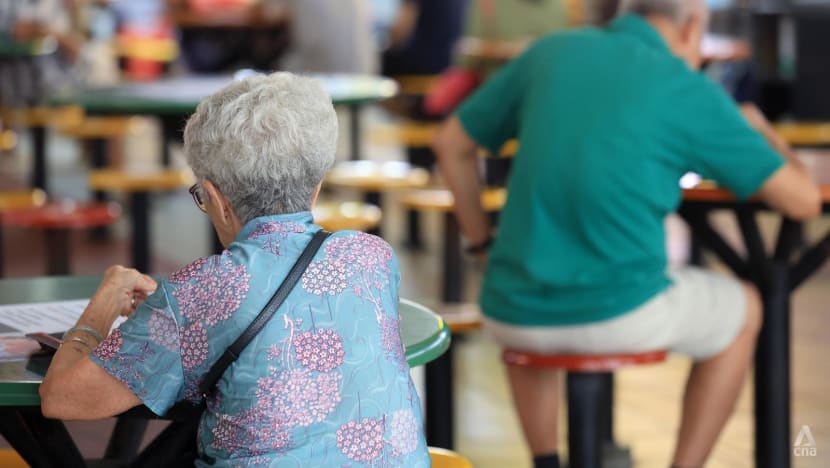Risk of malnutrition on the rise among older adults in Singapore, hospitals warn
Doctors are concerned about a greater risk of dementia or falls among seniors if the trend goes unchecked.

An elderly lady eating at Maxwell Food Centre on Feb 15, 2024. (Photo: Ooi Boon Keong/TODAY)

This audio is generated by an AI tool.
SINGAPORE: Several hospitals in Singapore have been seeing more cases of older adults at risk of malnutrition in the past two years, due to factors like multiple chronic illnesses and appetite changes.
According to NHG Health, the proportion of such patients who were admitted to its institutions rose from 30 per cent in 2022 to 40 per cent last year.
The healthcare cluster comprises three public hospitals, a community hospital and nine polyclinics, including Tan Tock Seng Hospital and Khoo Teck Puat Hospital.
“More are consuming insufficient energy and protein, and so this often results in unintended weight loss and a decline in physical function,” noted Adjunct Associate Professor Lim Yen Peng, NHG’s director of group allied health and senior principal dietician.
In 2023, about 56 per cent of patients seen by NHG Health’s dieticians were found to be malnourished or at risk of malnutrition. This rose to 66 per cent in 2025.
Doctors warned malnutrition could lead to a greater risk of dementia or falls among seniors.
AFFECTS MOOD, MEMORY
Adj Assoc Prof Lim said contributing factors include a decrease in appetite as people age due to changes in their sense of taste and smell. Eating less means seniors may not be getting enough nutrients from their meals.
Protein and key vitamins are especially lacking, said doctors.
According to the latest national nutrition survey conducted in 2022, one in two seniors aged 50 to 69 years old did not meet the recommended protein intake of 20g to 30g per meal – about a palm-sized chicken breast.
Other deficits include Vitamin D and calcium, which are required for bone health and preventing dementia.
Medical conditions like physical disabilities can also interfere with nutrition, while seniors who live alone may be unmotivated to prepare nutritious meals for themselves, noted Adj Assoc Prof Lim.
“Malnutrition can weaken the immune system, cause muscle loss, frailty and decreased function, increase the risk of falls and fractures, slow recovery and lead to longer hospital stays and re-admissions,” she added.
“It also affects mood and memory and ultimately, the quality of life and independence … That's why we need to act earlier to prevent the onset and progression of malnutrition.”
This worrying trend has also been observed by another healthcare cluster – the National University Health System.
Statistics from the cluster’s flagship hospital, National University Hospital (NUH), showed that one in seven older adults are at risk of malnutrition. About 2 to 3 per cent of its patients have been found to be malnourished.
Dementia can also cause malnourishment, as patients can forget what food is nutritious enough to eat. About a third of hospitalised dementia patients at NUH are at risk of being malnourished.
The situation has not improved despite greater awareness of the benefits of nutrition, said Assoc Prof Reshma Merchant, head and senior consultant at NUH’s geriatric medicine division.
“If the trend continues, the number of older people with risk of malnutrition is going to increase,” she added.
“We increasingly now know that nutrition is one of the key pillars for healthy ageing, as it supports muscle mass and memory … in terms of prevention of dementia, (boosting the) immune system. This was evident even during COVID.”
SingHealth, the third healthcare cluster – and the largest – in Singapore, did not respond to CNA’s queries.
WORKING WITH COMMUNITY PARTNERS
To keep this trend from escalating, hospitals have been working with community partners to educate seniors on better eating habits.
In June, NHG Health launched EatWise SG – a national initiative to help more seniors in the community by connecting them with dietitians. It aims to address issues like inadequate diet support and an under-recognition of malnutrition.
Meanwhile, NUH is working with Active Ageing Centres in the community and the Health Promotion Board to increase awareness about proper eating habits.
This includes telling seniors about protein requirements.
“For example, they’ll tell us, ‘We eat one egg a day.’ And I said: ‘One egg is only 6g of protein, but you need 20 to 30g of protein. So how are you going to supplement your breakfast besides the one egg?” noted Assoc Prof Reshma.
“When we have activities like cooking together, eating together, we do invite people who are at risk of malnutrition, as well as people who live alone, people who are lonely.”


















